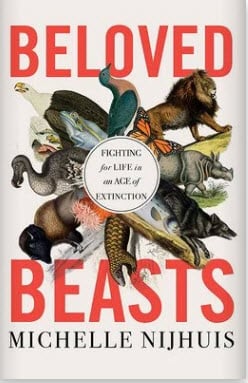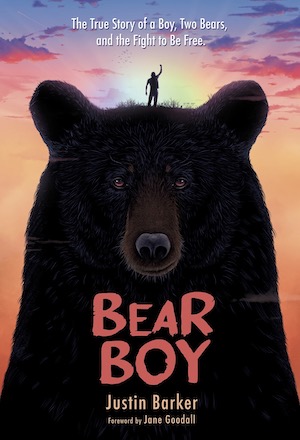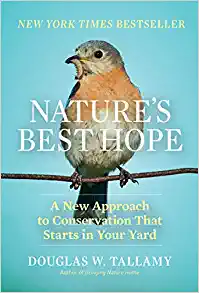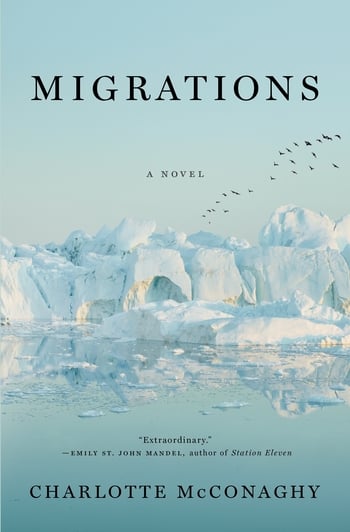In 2016, we began compiling lists of the best books we read that year (new or old, it didn’t matter).
And now here we are in 2021, and we’ve got another wonderful list of the best environmental books we’ve read this year. These may not be the books you’ll find in the top lists of publications like the New York Times, but that’s why we’re here — to draw attention to books that don’t often find mainstream attention (at least not yet).
Also, if you’d like to purchase any of these books, we’ve created a list on Bookshop.org, which helps support this blog.
See you in 2022!
Melissa Dennihy
Melissa Dennihy, Ph.D., is an English professor at Queensborough Community College of the City University of New York, where her work focuses in part on ecofiction and environmental humanities. You can find her on Twitter, where she's often tweeting about books: @MelissaDennihy.

Beloved Beasts is a richly informative history of the international conservation movement and the central figures who have played crucial roles in developing conservationism and moving conservation efforts forward. More…
Lillie Gardner
Lillie Gardner is a writer and pianist based in St. Paul, Minnesota. Her work has been published in the Slag Review and the Long River Review, and is forthcoming in the Delmarva Review. A practicing vegan, Lillie is a volunteer with Compassionate Action for Animals in Minneapolis and co-chair of Twin Cities Veg Fest.

HOMES by Moheb Soliman
This stunning collection of ecopoetry about the Great Lakes—Huron, Ontario, Michigan, Erie, Superior—is an engaging meditation on our ever-changing world and our place in it. Soliman’s poems are so perceptive, gorgeous, raw, and biting that you won’t be able to read them just once.

Bear Boy: The True Story of a Bear, Two Boys, and the Fight to Be Free by Justin Barker
In his memoir for young adults, Justin Barker writes about his years-long battle as a teen activist to save Ursula and Brutus, two bears stuck in a small cage in Roseville, California. In addition to being an inspiring and motivating read that gets you thinking about how you can make a difference in the world, Bear Boy is also a fun (and sometimes not-so-fun) tale of coming of age in the nineties.
JoeAnn Hart
JoeAnn Hart is the author of the novel Float, which swirls around conceptual art, bankruptcy, and plastics in the ocean. Her most recent book is Stamford '76, A True Story of Murder, Corruption, Race, and Feminism in the 1970s.

Nature’s Best Hope: A New Approach to Conservation That Starts in Your Yard
As a gardener and garden writer, I thought I knew all about native plants, but Tallamy in his excellent book Nature’s Best Hope was an education. He writes from the grim perspective that we will not survive the demise of the natural world, and yet it is full of hope because he has a plan. His proposal is this: What if each American landowner made it a goal to convert half their lawn to productive native plant communities? It could restore 20 million acres of what is now ecological wasteland. It would be the country’s largest park system.
Midge Raymond
Midge Raymond is a co-founder of Ashland Creek Press. She is the author of the novel My Last Continent and the award-winning short story collection Forgetting English.
This year I reviewed both of Charlotte McConaghy’s novels, and I can’t recommend them highly enough.

Migrations (published in 2020) is a stunningly beautiful novel about a woman who has always been running—from her childhood, her mistakes, her memories—and this time, she’s traveling from Greenland to Antarctica, following the world’s last flock of Arctic terns on their final migration. Migrations is the best type of environmental fiction in that it shows us, in eloquent and vivid prose, what is at stake and how the world will change once the animals are lost.

Once There Were Wolves (published in August) shares much in common with Migrations yet is entirely unique in its story of biologist Inti Flynn, who leads a team in Scotland to reintroduce gray wolves to the Highlands. McConaghy deftly captures the nuances of rewilding: the struggles within a community, the scientists’ doubts. This poetic and atmospheric novel is a mystery, a celebration of wolves, and a tribute to those who work to rewild our landscapes.

Ash Davidson’s Damnation Spring is a novel about logging that I’d recommend for even for the most ardent of tree-huggers. In beautiful prose, Davidson shows us a world that is starkly divided, and she keeps us as readers rooted in the world of the loggers—those who have cut down trees for generations and know of no other way to live, yet who hope for more for their own kids—and their families, whose lives depend on the less-than-steady pay (there’s no logging in the winter, when it rains) and who hold their breaths until their loved ones walk through the door at the end of a day. Damnation Spring is a must-read for environmentalists above all because when it comes to conservation, it’s so important to know what is being destroyed as well as is being saved—the solutions have to benefit everyone, or at least not devastate anyone.
John Yunker
Author of the novels The Tourist Trail and Where Oceans Hide Their Dead. Co-founder of Ashland Creek Press and editor of Writing for Animals (also now a writing program).

How to Be Animal by Melanie Challenger
Perhaps it is human nature to rank things. We rank cities and states and countries. We have the bestrestaurants and best movies; we even have best friends. And when it comes to our relationships with animals we share this planet with, there is a fair amount of ranking there as well, with the human animal emerging on top. Always on top.

Listen, We All Bleed by Mandy-Suzanne Wong
So much of animal activism is focused around what one sees — witnessing the beauty as well as the suffering of the animals we share this planet with.
But what about focusing less on one’s eyes and more on one’s ears?
Check out our “best of” lists from years past:
John is co-author, with Midge Raymond, of the Tasmanian mystery Devils Island. He is also author of the novels The Tourist Trail and Where Oceans Hide Their Dead. Co-founder of Ashland Creek Press and editor of Writing for Animals (also now a writing program).

